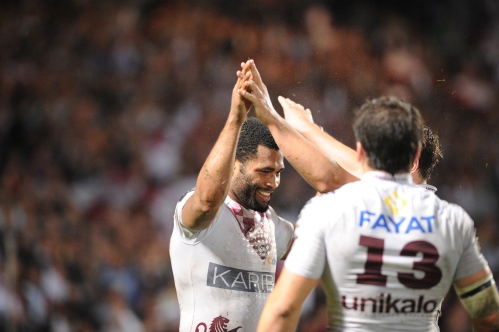Toulouse were on the attack, 30 metres from UBB’s tryline and with a 9-6 lead, when Clément Poitrenaud’s attempted offload went to ground. Talebula was onto it in a blink, toeing the ball 20 metres ahead and burning past the panicking Poitrenaud. Talebula won the race by a clear metre and gave the ball a second, more delicate touch with his left boot.
The hulking figure of Joe Tekori began looming over his shoulder, but Talebula calmly nudged the pill a third time with his right foot, by now just six metres from the Toulouse tryline. The ball struck the right-hand post, bouncing into Talebula’s expectant hands as he dived over to score.
For the ever-improving Metuisela Talebula, the outcome was never in doubt.
His close control makes sense when you learn that the 22-year-old had a spell at centre back for the football team at Drasa Secondary School in his native Lautoka, Fiji. His rugby career began with the Lautoka Crushers under-9s rugby league team, before he switched to union at the age of 16. Talebula won the Deans Trophy (Fiji’s premier schools competition) in 2009 and 2010, while also being chosen as Fiji Secondary Schools Player of the Year in ’09.
——————–
Having already played both league and union, it was in the third rugby code that Talebula first garnered international attention. His form in sevens competitions for the Natabua Rugby Club resulted in a call-up to the Fiji squad for the IRB London and Edinburgh sevens tournaments in May 2011. Having excelled at flyhalf, Talebula was named in Fiji’s U20 squad for the Junior World Championship the following month. Playing at fullback, outhalf and centre, the Lautoka man scored three tries in four starts.
The versatile back’s name (Talebulamaijaini in full) began to get around and Clermont, through their Nadroga academy in Fiji, invited him to France to view their facilities and partake in training. Following that brief experience, Talebula decided to sign a deal with the Fijian sevens set-up for the 2011/12 season and helped them to second place in the IRB World Sevens Series. The flyhalf scored 25 tries and finished second in the individual points-scoring charts with 271.
Racing Metro tracked the Fijian intently for some time and Clermont still had interest, but Talebula eventually signed his first professional 15-a-side contract with a far less renowned club. In June 2012, his move to Union Bordeaux-Bègles was announced, with Talebula telling the Bangkok Post, “I’m still 21 and have a long way to go in my rugby career, so I have decided to play overseas as it will help me develop the way I play. The level of competition there will make me a better rugby player.”
——————–
Earlier in the same month, the 6ft 1ins pace merchant had made a sensational start to his senior international career, scoring three tries in two appearances against Tonga and Scotland. Lining out at fullback, Talebula displayed the explosive running style and awareness that would make him such a success in France. Three more starts at fullback have followed for Fiji against England, Ireland and Georgia last November. There are many more caps to come.
Talebula’s first season with UBB was undoubtedly positive. Language and other cultural adjustments were mirrored by a bedding-in period on the pitch but after scoring in his seventh appearance the Fijian didn’t look back, ending the season with eight tries. Talebula mainly played on the wing, although he did start thrice at fullback. UBB’s backs coach Vincent Etcheto sees his future at outside centre.
Despite a physically taxing first season with Bordeaux, Talebula decided to join the Fiji squad for the Rugby World Cup Sevens in June. Reinstalled at flyhalf, he was the tournament’s top try-scorer with seven in six games, as Fiji finished in third place. Talebula’s sevens background and his positional versatility point to the rounded skill set he has developed.
——————–
Many Fijian backs are pure finishers, with Napolioni Nalaga a fine example. While Talebula is certainly lethal close to the tryline, there is more to his game. His kicking skills are complemented by excellent offloading ability and piercing vision. Defensively, he does not shirk responsibility and will only improve in this area as his French does too. Timid off the pitch, Talebula must work on his communication during games.
The year in France has seen the 22-year-old become more efficient athletically. Talebula has filled out to nearly 100kg but has retained his natural leanness. He always had speed but now his stride is that of a sprinter’s, streamlined and methodical. Ludovic Loustau, UBB’s préparateur physique, has taken Talebula’s raw physical potential and begun to shape it into something even more potent. The Fijian’s attitude and hard work have been to key to progress.
Upon joining UBB, the Lautoka native signed a two-year espoir contract (similar to a development contract). That deal expires next June and the likes of Toulouse, Clermont, Toulon and Leicester have already cast lustful glances in Talebula’s direction. However, his agent Frédéric Bonhomme told Midi Olympique that the Fijian is “attached to Bordeaux-Bègles and likes the atmosphere there. He knows it’s not a small club. It’s a club of great potential. Extending [his contract] is a genuine option.”
If UBB can uphold the standard they set against Toulouse last weekend, Talebula may consider staying. However, the graceful Fijian will be ready for bigger things by next season and the money men will come calling. UBB’s supporters should appreciate the Talebula show before it moves on.
——————–
Photo: UBB.





